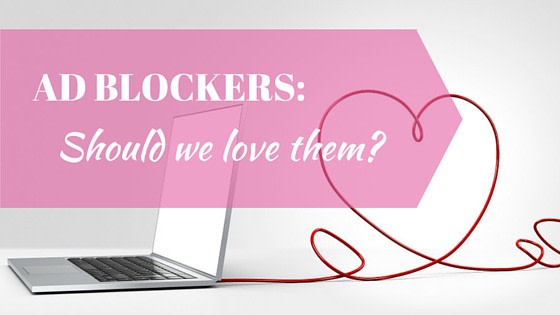
This post was most recently updated on September 19th, 2019
In the spirit of spreading love and not hate this month, we’ve decided to cover a particular phenomenon that tends to dishearten our publishers: ad blocking. Should we hate ad blockers completely? Or can we afford to love them instead?
To start with, let’s begin with some FAQs about ad blocking.
It mainly works alongside an ad blocker, usually a browser extension or even a mobile app. Once a user has installed an ad blocker, the mechanism rolls out in two ways:
Since publishers use a JavaScript code from ad providers, the domain blacklist approach takes the chunk of the work and is the more effective method. Some ad blockers are more complicated than they can actually filter any ad network so no ad passes through the user interface.
The root of this ad blocking practice stemmed from users’ disgust of a disrupted web experience brought about by intrusive ads. The bigger issue is actually fraudulent online activity: the spread of malicious software that produces these annoying ads (malvertisements) and malware that put user’s private data at risk.
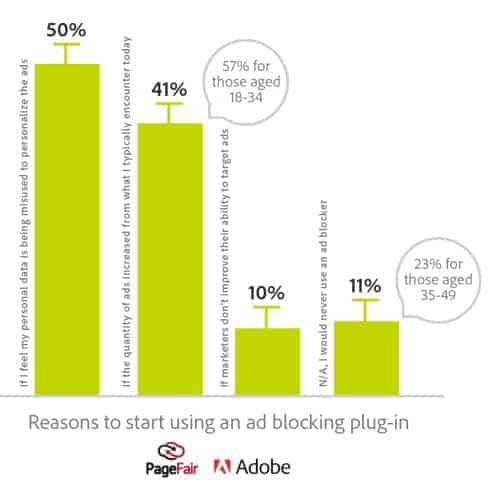
PageFair surveyed 400 US respondents and found that:
Malvertising is the root cause of ad blocking. – http://ctt.ec/fed7l+
Please welcome Julio Monzon, chief operating officer (COO) and head of the ad optimization team at MonetizeMore. Here is his honest take on how ad blocking has affected advertising and ultimately the web ecosystem:
“The Internet industry is one that is ever evolving. With mobile taking an exponential jump and desktop staying flat, it’s a new world out there and people are constantly looking for new and exciting content via mobile devices that are fast becoming the main way people get their content.
When a typical user hears ‘online advertising’ people think, ‘Ugh! I hate it when these ads distract from everything. I want to get an ad blocker’.
Fair enough, free world. But understand that you are affecting publishers who do not have those flashy, pop up, belly fat, ‘click here dammit’ ads that you don’t want to see.
What users need to be aware of is that the high quality content and high quality technology to run on your favorite sites needs the appropriate revenue to do so.
News flash ya’ll: Premium publishers, with the premium content you like so much, make money from advertising.”
Recently, Forbes launched a campaign to encourage users with ad blockers to disable their software, and in return, they will gain new ad-light experience for 30 days. If they didn’t, they’d be denied access to Forbes’ content. As expected, there was an initial protest on social media over the move, although it proved to be a rather successful initiative in the end. But ultimately, Forbes’ main concern over the outcry was: “If too many ad-blocking users bolted rather than disable the software, the one-two punch of fewer readers and less sharing across the web could negatively affect a writer’s income.” That’s the implication for most publishers who hire or outsource writers.
By industry, gaming sites are the most affected by the ad blocking phenomenon. In the study, it was pointed out that demographics played a major role. Young, tech-savvy males are more likely to block ads, affecting the industries that cater to them.
Social networking sites, a common source of questionable or fraudulent traffic, come in second at 19% share in global ad blocking.

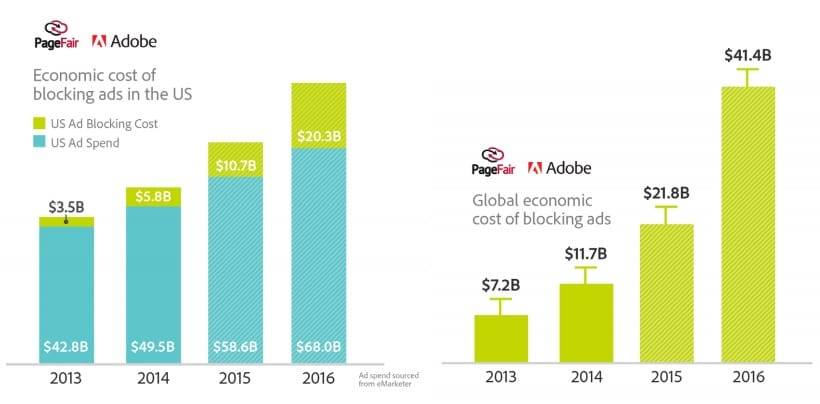
Julio Monzon shares:
Yes, it’s true. Ads can be annoying. Who likes pop ups, pop-unders, and intrusive auto-sound video ads that start playing and that you can’t find for the life of you? It’s frustrating.
Read: 5 Ways Publishers Can Fight Ad Blocking through Better User Experience
I strongly feel, however, it’s just a matter of educating users about the difference between these lousy ads and the quality ones that are tastefully placed in order for the publisher to make the money they deserve from you visiting the site, using their service, or enjoying their quality content.
Give this question some serious thought:
As a user myself, I can empathize that when I have one bad experience with an intrusive ad (when all I want to do is read my tech article), I wish I had something to block it and I would jump at the use of an ad blocker. But for sites I use to get my content that have tasteful ads that are well placed, I just never think of it. I either ignore the ad, or click on it if it has strong relevance to me.
“In conclusion, these spammy, belly fat, pop up, and flashy ads give our industry a bad name and have pushed users to the brink of blocking any and all ads. However, next time you think about installing this, keep in mind how that will affect [those] quality publishers you use and how advertisements make your access free.”
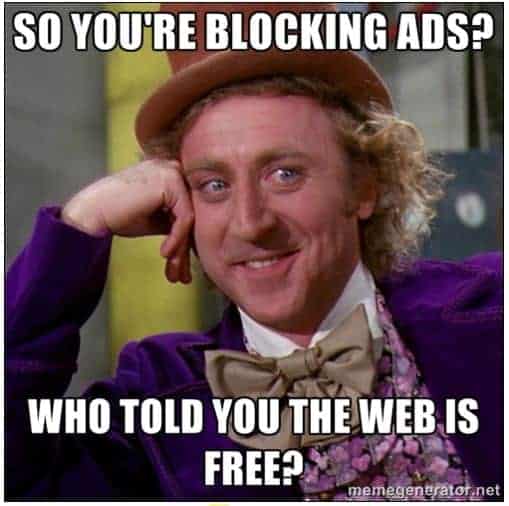
Remember the famous love quote: “I would have never found the right one if not for you.” The same applies to ad blocking. If not for this phenomenon, publishers would not have gone to the direction of improving user experience. Forbes, as mentioned in this article, came up with a “less ad-laden interface” and asked users to disable their ad blockers.
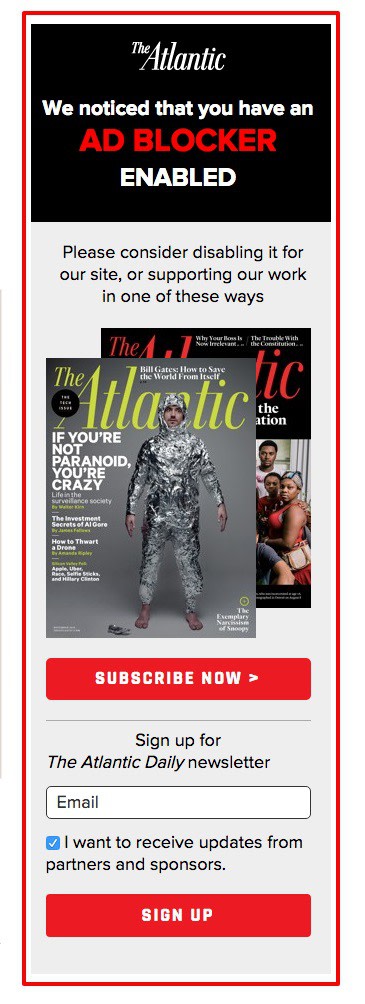 image credit: Pubnation
image credit: Pubnation
While these publishers are trying to find a workaround, others like Stack Overflow DO NOT CARE!
To them, ads that are blocked and ignored are the low-performing ones with poor CTRs. Therefore, these do not give any ROI to them (might as well, block them?).
Here’s how Steve Feldman, senior ad ops manager at Stack Overflow, puts it:
“Our belief is that if someone doesn’t like them, and they won’t click on them, any impressions served to them will only annoy them – plus, serving ads to people who won’t click on them harms campaign performance. That focus on relevance and performance arrives early in the QA process. Whether it’s our salespeople explaining that ads must have borders, or our campaign managers checking landing pages to ensure they adequately inform, we are thorough.”
Well, yes, in the sense that they deserve the ad industry’s attention. Ad blockers should be valued as catalysts to a safer world wide web. They break our hearts, indeed, but they push us to become better versions of ourselves (and our websites).
Display only safe and whitelisted ads on your site. We can manage and protect your ad inventory.
Sign up to Ad Exchange or become our Premium Publisher to get started.
Related reads:
10X your ad revenue with our award-winning solutions.